最新牛津上海版英语六年级下册全册复习资料
上海版牛津英语六年级第二学期总复习

上海版牛津英语六年级第二学期总复习一、用单词的适当形式填空(词性转换题)解题秘诀:1、读题,根据上下文确定填空处应该填何种词性的词。
2、确定该词的词性变化。
注意大小写。
必备知识:Unit 1 Great cities in Asialove---lovel usual---usually swim---swimming build—building east---easten city---citiessouth---southen west---westen north---northen satisfy---satisfied decide---decision Asia----Asiantour---tourist different----difference visit---visitor fame---famous spice---spicyUnit 2 At The AirportScarf---scarves arrive---arrival Depart---departure fly---flightWorry---worried travel---tripUnit 3 Dragon Boat Festivalcelebrate----celebration danger----dangerousfive---fifth sad---sadlysalt---salty with—withoutlike--dislikeUnit4 Staying healthyHealth---healthy--- unhealthy real---reallyLate---laterAct---activity ---activities ---active tooth---teethFun---funny avourite---favour exercise (n. v.)锻炼exercises (n.)练习, 体操*morning exercises 早操One---once two---twicehelp (v.n.) –helpful (a.) –*helpless (a.) –*helper (n.Unit 5 What will I be like?possible (a.) –possibly (ad.) slim (a.)slimmer (比较级) heavy (a.) –heavily (ad.) heavier (比较级)magic (a.) –magician (n.) reporter (n.)—report (v. n. ) baker (n.) –bake (v.) bakery (n.) singer (n.)—sing (v.) teacher (n.)—teach (v.) cook (n.) –cook (v.) * cooker n. 炊具weigh (v.)—weight (n.) *high (a.)—height (n.)Unit 6 Seasonal changes1. seasonal (adj.) -- season (n.) change ( n.v. ) -- *changeable (adj.) shorts ( n.)--short ( adj.) 可数:*生命save my life*lives (pl.) life n.不可数:生活school life live (v.) *living adj. (定语) *alive adj. (表语)5.air-conditioned (adj.)--- air-conditioner (n.)Unit 7 Travelling in Garden Citytravel (v.) –travelling ( n.) *traveller (n.)few (a.) –fewer (比较级) little (a.)—less (比较级) many, much –more (比较级) drive (v.)—driver (n.)park (v.) –park (n.) pass (v.)—passenger (n.)-passage(段落) cross (v.)—crossing (n.)-across(prep.) a man driver—some men drivers(复数) a woman driver—some women drivers(复数)Unit 8 Windy weatherwindy (a.)—wind (n.) gentle (a. )—gently (ad.) tight ( a. )—tightly (ad.) slight (a. )—slightly (ad.) clean (a. v.)—cleaner (n.) happy (a.)—happily (ad.) slow (a.)—slowly (ad.) quick (a.)—quickly (ad.) immediate (a.)—immediately (ad.) fierce (a.)—fiercely (ad.) careful (a.)—carefully (ad.)—*care (n. v.) heavy (a.)—heavily (ad.) safety (n.)—safe (a.)—*safely (a.) inside(opposite )—outside fish (n. v.) –fisherman ( fishermen)Unit 9 Sea Water and rain waterlarge–larger—largestintelligent—more intelligent—the most intelligentdangerous—more dangerous—the most dangerousintelligent (a.)—* intelligence (n.) danger (n.)—dangerous (a.)interesting (a.)—interested (a.)—interest (v. n) beautiful (a.)—*beauty (n.) pollute (v.) –pollution (n.) —polluted (a.)fireman (复数)—firemen,tooth (复数)—teeth, dish (复数) –dishes, farm (n.)—farmer (n.) water (n.)—water (v.)die (v.)—*dead (a.)—dying (a.) —*death (n.)cook ( v.) –cook (n.)—*cooker (n.) drip (v. )—dripping (a.)run (v.)—running (a.)—runner (n.)cross (n.)—cross (v.)—crossing (n.) —across (prep.)waste (v.)—waste (n.)save (v.) –safe (a.)—safety (n.) —safely (adv.)use (v.)—use (n.)—useful (a.) —useless (a.)cover (v.)—discover (v.) –*discovery (n.)二、用动词的正确形式填空解题秘诀:1、根据题目的时间状语或者上下文判断时态。
上海版牛津英语六年级(上下)全重点
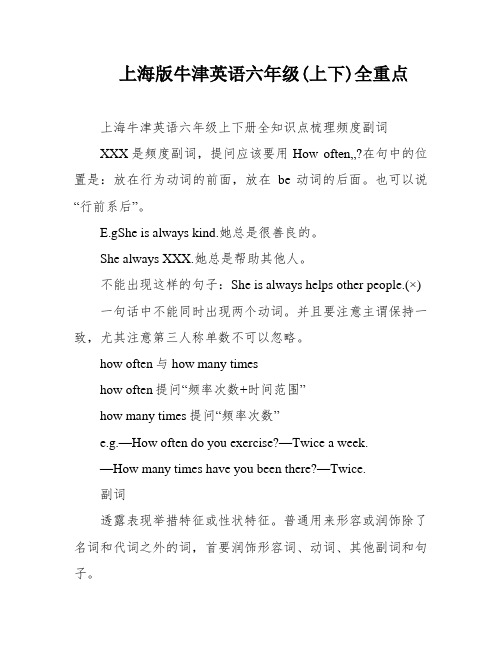
上海版牛津英语六年级(上下)全重点上海牛津英语六年级上下册全知识点梳理频度副词XXX是频度副词,提问应该要用How often…?在句中的位置是:放在行为动词的前面,放在be动词的后面。
也可以说“行前系后”。
E.gShe is always kind.她总是很善良的。
She always XXX.她总是帮助其他人。
不能出现这样的句子:She is always helps other people.(×) 一句话中不能同时出现两个动词。
并且要注意主谓保持一致,尤其注意第三人称单数不可以忽略。
how often与how many timeshow often提问“频率次数+时间范围”how many times提问“频率次数”e.g.—How often do you exercise?—Twice a week.—How many times have you been there?—Twice.副词透露表现举措特征或性状特征。
普通用来形容或润饰除了名词和代词之外的词,首要润饰形容词、动词、其他副词和句子。
XXX happy.(修饰形容词)The old lady is XXX.(修饰动词)Luckily, he got the first prize.(润饰句子)形容词后面+ly组成副词:slow—slowlyslight—XXX—luckilyhappy—happily介词What else do you do with your…?你和你的…还干什么?With是个介词,后面接人称代词时,要用宾格的形式。
With me/him/her/it/us /them在详细的某一楼层只能用介词on,而且第几层还要用序数词On the ground floor, on the first floor, on the XXX详细的某一天介词只能用onOn Sunday, On Sunday morning,On the Open Dayhe one on the left/right左边/右边的这个the one in the middle中间的这个如果是介词短语修饰the one,应该要放在the one后面,如果是形容词应放the one的中间the left/right onethe middle oneXXX XXX在周末目前完成时现在完成时的构成是:have/has +动词的过去分词。
上海版牛津英语六年级上、下全重点知识点复习整理
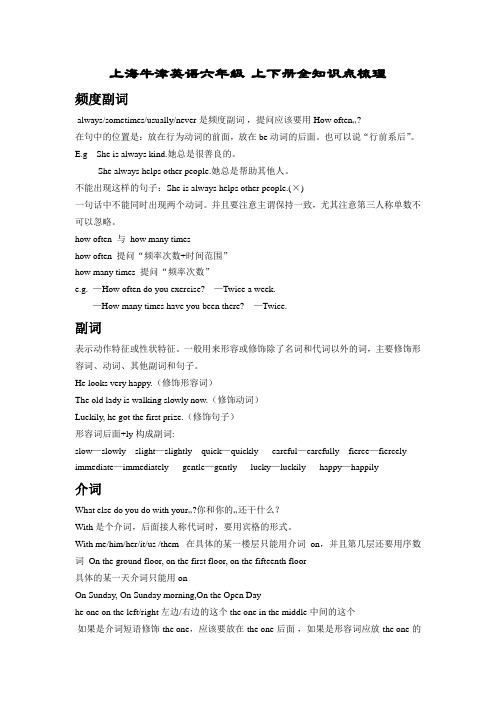
上海牛津英语六年级上下册全知识点梳理频度副词always/sometimes/usually/never 是频度副词,提问应该要用How often…?在句中的位置是:放在行为动词的前面,放在be动词的后面。
也可以说“行前系后”。
E.g She is always kind.她总是很善良的。
She always helps other people.她总是帮助其他人。
不能出现这样的句子:She is always helps other people.(×)一句话中不能同时出现两个动词。
并且要注意主谓保持一致,尤其注意第三人称单数不可以忽略。
how often 与how many timeshow often 提问“频率次数+时间范围”how many times 提问“频率次数”e.g. —How often do you exercise? —Twice a week.—How many times have you been there? —Twice.副词表示动作特征或性状特征。
一般用来形容或修饰除了名词和代词以外的词,主要修饰形容词、动词、其他副词和句子。
He looks very happy.(修饰形容词)The old lady is walking slowly now.(修饰动词)Luckily, he got the first prize.(修饰句子)形容词后面+ly构成副词:slow—slowly slight—slightly quick—quickly careful—carefully fierce—fiercely immediate—immediately gentle—gently lucky—luckily happy—happily介词What else do you do with your…?你和你的…还干什么?With是个介词,后面接人称代词时,要用宾格的形式。
牛津上海版六年级下Unit1-Unit3重点知识点复习教案

六年级下UI-3重点知识点复习教案Module 1 Unit 1 知识点梳理重点词组1. the capital of China 中国的首都2. like/enjoy doing sth. 喜欢做某事3. more than 超过(同义词)over4. huge department stores 大的百货商店5. go shopping 去购物 go swimming去游泳…6. at these beautiful beaches 在这些美丽的海滩7. from…to 从…到8. in the past 在过去9. other places 别的地方10. millions of 成百万的 15 million 一千五百万11. famous buildings (well-known) 著名的建筑12. much information 很多的信息 a piece of information一条信息13. by plane/ ship/ train 比较:take a plane / a ship / train14. two and a half hours / two hours and a half 两个半小时重点句型1.How far is it from Shanghai to Beijing?It’s about 1400 kilometres.2.How can we travel to Beijing?We can travel by train.3.How long does it take to travel from Shanghai to Beijing by train?It takes about ten hours.4.It’s north-east of Shanghai.小作文范文Shanghai is one of the biggest cities in the world. It is south of Beijing. There are about 25 million people in Shanghai. There are many famous buildings and beautiful places there. Such as Jinmao building, and Fuzi Temple. They are very famous places. World Expo 2010 was held in Shanghai last year. More than 70 million people visited Shanghai. I am so proud of being a citizen in Shanghai.Module 1 Unit 1 复习练习Ⅰ. 默写1. 中国的首都 ________________2. 超过__________ __________3. 喜欢做某事________________4. 去购物________________5. 在这些美丽的海滩________________6. 两个半小时__________ __________7. 成百万的________________ 8. 著名的建筑________________Ⅱ. Choose the best answer.( ) 1. Tokyo is ________ capital of Japan.A. theB. aC. anD. /( ) 2. How do you travel to Beijing?_________.A. By a plane.B. By the plane.C. By plane.D. Take a plane. ( ) 3. ---How far is it _______ your home _______ school?---About five minutes’ walk.A. from; toB. to; toC. to; atD. at; in( ) 4. ---How long did it take you to go to the hospital yesterday?---It ______ me about half an hour.A. takesB. tookC. takeD. is taking( ) 5. The children enjoy ______ games in the playground.A. playB. playingC. playsD. played( ) 6. In the past, people _______ to work by bus.A. goB. wentC. goesD. are going( ) 7. ---How many people are there in Tokyo?---There are about _______ people there.A. 12 millionsB. 12 millionC. 12 millions ofD. 12 million of( ) 8. ---______ city is the most beautiful city in China?---I think it’s Shanghai.A. WhatB. WhereC. WhichD. How many( ) 9. ---_______ is it from Shanghai to Beijing?---It’s about 1400 kilometres.A. How longB. How farC. How soonD. How often( ) 10. It takes me about _______ to get there.A. a hour and a halfB. one hour and halfC. one and half hourD. one and a half hoursⅢ. Complete the sentences with the given words in their proper forms.1._______ (tour) usually go window-shopping in big cities.2.How many capital _______ (city) have you learnt till now?3.Would you like to travel to other ________ (place) with us?4.We enjoy ______ (swim) in summer.5.Can you see many tall _______ (build) in Pudong?Ⅳ. Rewrite the following sentences as required1.It takes Alice about an hour to draw the picture.(对划线部分提问)_______ _______ does it take Alice to draw the picture?2.There are about 8 million people in Bangkok. (对划线部分提问)________ _______ people are there in Bangkok?3.It’s about 1400 kilometres from Shanghai to Beijing. (对划线部分提问)________ _______ is it from Shanghai to Beijing?4.He usually walks there. (保持句意不变)He usually goes there _______ _______.5.He has his lunch in the classroom. (改为一般疑问句)_______ he ______ his lunch in the classroom?Module 1 Unit 2 知识点梳理重点词组1. a plane ticket 一张飞机票2. several silk scarves(scarf)几个丝绸围巾3. plan to do sth. 计划做某事4.stay here/there 呆在这儿/那儿5.plenty of T-shirts 大量的T恤6. pack one’s suitcases 装箱7.enough/plenty of space(room) 足够/大量的空间8.too many things太多的事情9. drive sb. to sp. 开车送某人去…10.leave for Los Angeles 离开去洛杉矶11.arrive at the airport 到达机场 get to / reach12.the departure time 出发时间13.have to do sth.不得不做…14.a boarding card 登机牌15.a name tag 姓名标签16. trolleys 手推车重点句型1.All passengers must arrive at the airport two hours before the departure time.2.---Have you brought your passports yet?---Yes, I’ve already brought our passports.---No, I haven’t brought our passports yet.3.There’s plenty of space in my suitcase for your clothes and silk scarves.不规则动词表be(am, is, are) was/were been become became becomebring brought brought buy bought boughtdo did done eat ate eatenfall fell fallen fly flew flownget got got have had hadlose lost lost make made madeput put put say said saidsee saw seen take took takenModule 1 Unit 2 复习练习Ⅰ. 默写1. 几个丝绸围巾______________2. 计划做某事______________3. 大量的T恤 ______________4. 足够的空间______________6. 太多的事情 ______________7. 太多的事情______________8. 离开去洛杉矶______________ 9. 不得不做______________10. 到达______________ ______________ ______________14. 过去式,过去分词fall________ ________ buy________ ________ fly________ ________ get________ ________ make________ ________ take________ ________ see________ ________Ⅱ. Choose the best answer.( ) 1. There is ______air ticket to Tokyo.A. anB. theC. aD. /( ) 2.I think we should arrive______ Japan at three.A. inB. atC. forD. from( ) 3.I haven’t made any invitations ______.A. alreadyB. justC. onlyD. yet( ) 4.I have been in Beijing ______ two weeks.A. forB. inC. toD. on( ) 5.I don’t have any ______ for my bookcase in my room.A. roomB. roomsC. placeD. spaces( ) 6.Have you got your ______ card yet? No, I haven’t .A. boardB. boardingC. broadD. broading ( ) 7.Grandparents ______ to America before.A. wentB. has beenC. have goneD. have been ( ) 8.Is your brother planning ______?A. to leaveB. leaveC. leavingD. leaves ( ) 9.______ does it take to travel to Bangkok?A. How farB. How longC. How oftenD. How soon ( ) 10.Do you want me to drive you ______home?A. toB. /C. forD. fromⅢ. Complete the sentences with the given words in their proper forms.1.Look! There are so many ________ in that shop. (scarf)2.Kitty is writing a ________ for their family trip. (check)3.There are plenty of ________ in Shanghai. (shop)4.There are ten minutes left before the ________ time. (depart)5.All ________ must get on the bus one by one. (passage)Ⅳ.Rewrite the following sentences as required.1. The Smith family is going to stay in India for a week. (对划线部分提问)________ ________ is the Smith family going to stay in India?2. Lili’s got a pair of scissors.(否定句)Lili_______ ________ a pair of scissors.3. Sue goes to Beijing by air.(对划线部分提问)________ ________ Sue go to Beijing?4. Paris is the capital of France.(对划线部分提问)________ ________ is the capital of France?5. The students are reading some information about great cities in Asia . (对划线部分提问) ________ are the students ________?Module 1 Unit 3 知识点梳理重点词组1.dragon boat races 端午节2.a salty rice dumpling with meat 一个带肉的咸粽子3.sweet rice dumplings without beans 没豆的甜粽子4.would like to do sth. 想要做某事 want to do sth would rather do sth 宁可做某事5.know sth. about … 了解关于…6.take one’s advice接受某人的建议7.be in danger 处于危险当中8.on that day 在那天9. be born 出生于10. die v. 死 be dead adj 死的 death n. 死亡11. lose a battle 战争失败12. be sad (unhappy)伤心的13. ones 用来代替可数名词的复数重点句型1.Do you like rice dumplings?I like…, but I don’t like…2.It was the fifth day of the fifth lunar month of that year.3.Would you like some…?Yes, please. I like…No, thanks. I don’t like…I’d rather have…4. His job was to give advice to the king.小作文范文The Spring Festival is coming. We are all very happy. We are looking forward to it. I will go to Shanghai with my parents. I’ll visit Shanghai Museum. I will get some money from my parents and my grandfather. I’ll use the money to buy some nice books and a nice watch. After the Spring Festival, I will be one year older. I hope I can learn more in the coming new year.Module 1 Unit 3 复习练习Ⅰ.默写1. 一个带肉的咸粽子______________2. 没豆的甜粽子______________3. 想要做某事 ______________4. 宁可做某事 ______________5. 了解关于 ______________6. 接受某人的建议______________7. 处于危险当中 ______________8.农历五月初五________________Ⅲ. Choose the best answer.( ) 1. The king always took ______ advice.A. heB. himC. hisD. himself ( ) 2. Doctors’ job is ______ people’s lives.A. saveB. savesC. to saveD. saved ( ) 3. There are many skirts in the shop windows. Do you like the red ______?A. oneB. onesC. one’sD. that( ) 4. Would you like ______ sausages?A. someB. anyC. /D. many( ) 5. His parents send him a toy car ______ his birthday.A. to celebrateB. for celebrateC. to celebratingD. in celebrate( ) 6. I don’t like sweet food and I’d ______eat sour lemons.A. enjoyB. ratherC. likeD. want( ) 7. I would like to know ______ about the Dragon Boat Festival.A. everythingB. nothingC. anythingD. something( ) 8. The new king lost a battle because he did not ______Qu Yuan’s advice.A. bringB. takeC. pushD. carry( ) 9. Don’t swim in this deep river, or you’ll be ______ danger.A. inB. onC. fromD. at( ) 10. My English teacher always gives me ______ on how to learn English well.A. an adviceB. some advicesC. a lot of advicesD. some adviceⅣ.Complete the sentences with the given words in their proper forms.1.Which do you like better, the ______ rice dumplings or the sweet rice dumplings? (salt)2.How can you take this heavy suitcase ______ a car? (with)3.I asked my mother for help and she gave me some ______. (advise)4.I like the red woolen scarves but I don’t like the black ______. (one)5.That lady ______ a wallet last week. (lose)Ⅴ. Rewrite the sentences.1.She’d like some cookies. (改为一般疑问句)___________ she like___________ cookies?2. I love salty rice dumplings. I love sweet rice dumplings. (两句并成一句)I love ___________ salty rice dumplings___________ sweet rice dumplings.3.If there is no air, we can’t live. (保持句意不变)We can’t live ___________ ___________.4.I’ d like to send him some scarves as presents. (保持句意不变)I___________to send some scarves ___________him as presents.5.People have dragon boat races to remember Qu Yuan. (对划线部分提问)___________ do people ___________ dragon boat races专题知识梳理——现在完成时一、现在完成时的构成1. 肯定式:主语+have/has +过去分词+其它① I've just copied some new words. 我刚抄写了所有的生词。
最新牛津上海版英语六年级下册全册复习资料
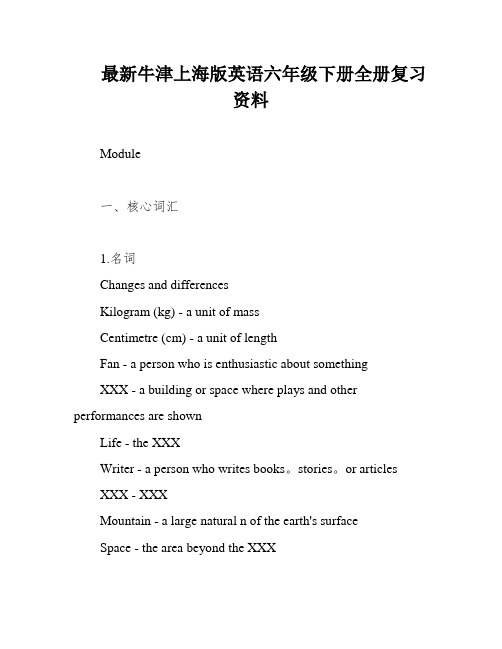
最新牛津上海版英语六年级下册全册复习资料Module一、核心词汇1.名词Changes and differencesKilogram (kg) - a unit of massCentimetre (cm) - a unit of lengthFan - a person who is enthusiastic about somethingXXX - a building or space where plays and other performances are shownLife - the XXXWriter - a person who writes books。
stories。
or articlesXXX - XXXMountain - a large natural n of the earth's surfaceSpace - the area beyond the XXX2.动词Weigh - to determine the weight of somethingDrive - to operate a XXXCarry - to hold or support something while moving3.其他Poor - XXXEven - used to XXX4.短语Street cleaner - a person who cleans the streets二、拓展词汇1.名词Photographer - a person who takes photographsFilm - a XXX flexible strip coated with light-sensitive XXX Broom - a long-XXX sweepingWife - a married womanFairy - XXXPS - postscript。
a note added to the end of a letter after the signatureDinosaur - XXX years ago2.动词Sweep - to clean a surface using a broom3.形容词- extremely goodDigital - XXX4.副词Online - connected to the。
(完整版)上海版牛津英语六年级下册6B重点知识点复习整理(最新整理)

(完整版)上海版牛津英语六年级下册6B重点知识点复习整理(最新整理)上海版牛津英语六年级下册6B重点知识点复习整理Module 1 City LifeUnit 1 Great cities in Asia【知识点梳理】1.方位词:east / west / north / south / north-east / north-west / south-east / south-west用法:a. 两地不相邻: e.g. A is north B. (= to the south of)b. 两地接壤: e.g. A is on the north of B.c. 所属关系,A包含B, B属于A: e.g. B is in the north of A.2. by + 交通工具表示“乘……交通工具”, 用how进行提问e.g. by bus / ferry / train / ship / underground… by plane = by air, by ship = by sea3. How far…多远(询问距离的远近,路程的长短)e.g. Hoe far is it from your home to school? 从你家到学校有多远?4. How long…多长,多久(询问时间的长短,提问一段时间)e.g. How long does it take to travel from Shanghai to Beijing by train? 坐火车从上海到北京要花多长时间?5. It takes (sb.) some time to do sth. 做某事需要花费多少时间e.g. It takes me five hours to make this modal plane. 做这个模型飞机花了我5个小时。
6. like / love / enjoy doing sth. 喜欢做某事e.g. The people in Bangkok like / love / enjoy eating spicy food. 曼谷人喜欢吃辛辣食物。
【最新】牛津英语上海版六年级下册知识点整理

牛津英语上海版六年级下册知识点整理Module1City lifeUnit1Great cities in Asian词组:the capital of... ...的首都north-east东北from...to...从...到...in the past在过去the Great Wall长城more than=over超过eat dumpling吃饺子 tall buildings高楼大厦huge department stores大型的百货商店a lot of许多语法点:1.Beijing is north of Shanghai.北京在上海的北部。
(1)两地不相邻:A is north of B.(2)所属关系:A is in the north of B.(3)两地接壤:A is on the north of B.2.How far is it from Shanghai to Beijing?从北京到上海有多远?How far...多远。
询问距离的远近,路程的长远。
3.How long does it take to travel from Shanghai to Beijing by train?坐火车从上海到北京要多久?(1)How long...多久。
询问时间长短。
How long…多长。
用于询物的问长度。
(2)by+交通工具,表示“乘...交通工具”,用How提问。
4.It takes about ten hours.大约需要十小时It takes(sb.)st.to do sth.做某事需要花费多长时间。
5.They enjoy eating dumplings.他们喜欢吃饺子enjoy/like/love doing sth.喜欢做某事6.Two and a half days=Two days and a half两天半Half an hour=one and a half hours=one/an hour and a half一个半小时Unit2At the airport词组:plane ticket机票silk scarf丝巾 a lot of/plenty of大量的,许多departure time出发时间leave for出发去某地 have to不得不be going to将要arrive at到达boarding card登机牌name tap姓名语法点:1.Aunt Judy and Uncle Mike have lived in Los Angeles for six years.朱迪婶婶和迈克叔叔在洛杉矶已住了六年。
牛津沪教版英语六年级下基础知识复习
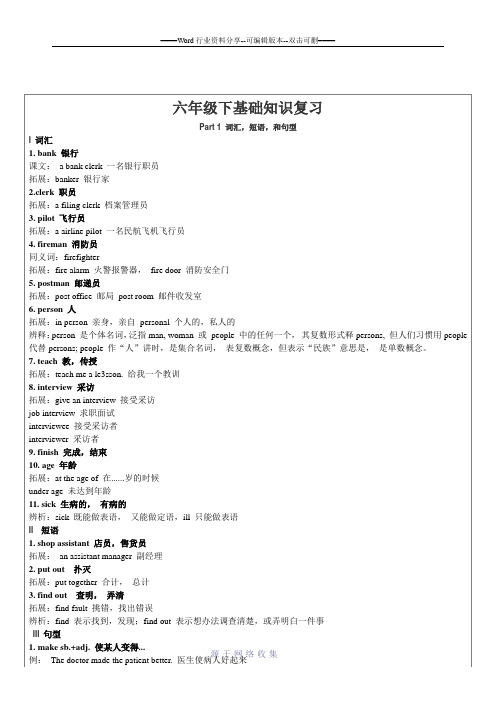
5. postman邮递员
拓展:post office邮局post room邮件收发室
6. person人
拓展:in person亲身,亲自personal个人的,私人的
辨释:person是个体名词,泛指man, woman或people中的任何一个,其复数形式释persons,但人们习惯用people代替persons; people作“人”讲时,是集合名词,表复数概念,但表示“民族”意思是,是单数概念。
2.Mary is absent from the class today,because she is ill.玛丽今天没有来上课,因为她生病了。
B.because不能和so同时出现在一个句子中。例如:
(错)Because it is raining outside,so we can't go shopping today.
A.What would you like to be?你想成为什么?
这是由what引导的特殊疑问句用来询问某人希望自己将来从事什么职业,例如:
1.--What would you like to be?你想成为什么?
--I'd like to be a doctor.我想当一名医生。
2.--What would your sister like to be?你姐姐想成为什么?
1.I’d hate you to thinkIwas criticizing you.我可不愿让你觉得我是在批评你。
2.I'd be only too glad to help.我非常愿意帮忙。
B.缩略式常写为“’d”,I’d=Iwould我想……否定式为would not,其缩略式为“wouldn’t”,例如:
新沪教牛津版六年级下册小学英语全册单元知识点小结
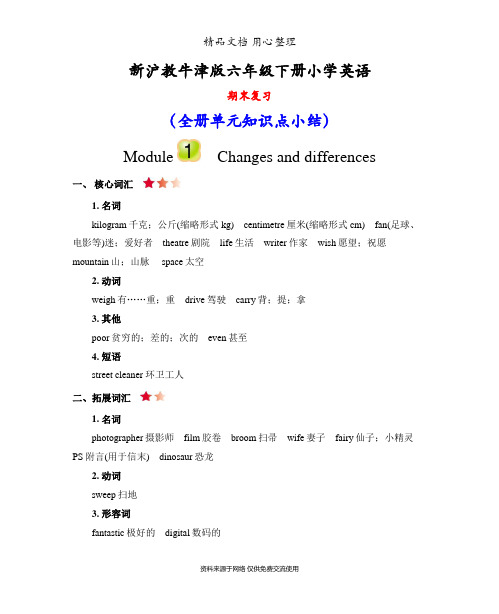
新沪教牛津版六年级下册小学英语期末复习(全册单元知识点小结)Module Changes and differences一、核心词汇1. 名词kilogram千克;公斤(缩略形式kg)centimetre厘米(缩略形式cm)fan(足球、电影等)迷;爱好者theatre剧院life生活writer作家wish愿望;祝愿mountain山;山脉space太空2. 动词weigh有……重;重drive驾驶carry背;提;拿3. 其他poor贫穷的;差的;次的even甚至4. 短语street cleaner 环卫工人二、拓展词汇1. 名词photographer摄影师film胶卷broom扫帚wife妻子fairy仙子;小精灵PS附言(用于信末)dinosaur恐龙2. 动词sweep扫地3. 形容词fantastic极好的digital数码的4. 副词online在线地;在线的5. 代词themselves他们自己;她们自己;它们自己6. 其他taller更高的7. 短语go fishing去钓鱼enjoy oneself玩得愉快;得到乐趣get … in收割street sweeper扫地车by hand用手right away立即;马上in a short time很快head teacher 校长 a piece of一张;一片have a picnic去野餐better and better越来越好三、核心句型1. I’m 150 centimetres tall. 我身高150厘米。
解读:这是介绍身高的句型。
“主语 + be动词 + 数字 + 长度单位(+ tall).”可以用来介绍某人的身高。
举一反三: My cousin is 154 centimetres tall. 我的堂弟身高154厘米。
Jim is 149 centimetres tall. 吉姆身高149厘米。
2. There are a lot of tall buildings in the city. 城市里有很多高大的建筑物。
牛津上海版(三起)六年级下册英语知识梳理
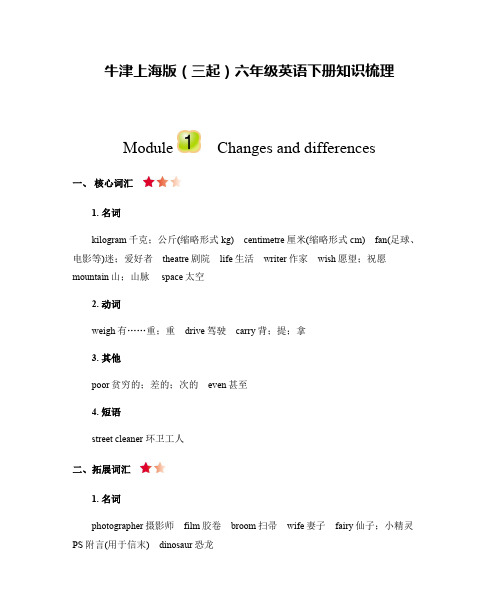
牛津上海版(三起)六年级英语下册知识梳理Module Changes and differences一、核心词汇 1. 名词kilogram千克;公斤(缩略形式kg) centimetre厘米(缩略形式cm) fan(足球、电影等)迷;爱好者 theatre剧院 life生活 writer作家 wish愿望;祝愿 mountain山;山脉 space太空2. 动词weigh有……重;重 drive驾驶 carry背;提;拿3. 其他poor贫穷的;差的;次的 even甚至 4. 短语street cleaner 环卫工人二、拓展词汇 1. 名词photographer摄影师 film胶卷 broom扫帚 wife妻子 fairy仙子;小精灵 PS附言(用于信末) dinosaur恐龙2. 动词sweep扫地3. 形容词fantastic极好的 digital数码的 4. 副词online在线地;在线的5. 代词themselves他们自己;她们自己;它们自己6. 其他taller更高的7. 短语go fishing去钓鱼 enjoy oneself玩得愉快;得到乐趣 get … in收割 street sweeper扫地车 by hand用手 right away立即;马上 in a short time很快 head teacher 校长 a piece of一张;一片 have a picnic去野餐 better and better越来越好三、核心句型 1. I’m 150 centimetres tall. 我身高150厘米。
解读:这是介绍身高的句型。
“主语 + be动词 + 数字 + 长度单位(+ tall).”可以用来介绍某人的身高。
举一反三: My cousin is 154 centimetres tall. 我的堂弟身高154厘米。
Jim is 149 centimetres tall. 吉姆身高149厘米。
牛津沪教版英语六年级下册复习(讲义)

U1一how much how tall do exerciseafter school go fishing how exciting live in a lot of go to workby car at the weekend enjoy oneself = have fun = have a good timeride their bikes plant crops get the crops inin spring fly a kite read a booksee a film be from = come from二1.How much do you weigh?I weigh 40 kilogram s.2.How tall are you?I’m 152 centimetres tall.3.What do you usually do after school?I usually play table tennis after school.4.I’m 152 centimetres tall. You are154 centimetres tall.You are taller.5.频度副词可放在句首,句中,句末。
6.There’s no river near my home.7.high -- height weigh -- weight8.myself yourself himself herself itselfoursel ves yoursel ves themsel ves9.There are a lot of houses with gardens in the countryside.10.a-e ai ay eight ai l p ai nt n ai l pr ai se mount ai nm ay d ay st ay Sund ayw eight eigh t w eigh n eigh bour11.i-e y igh iefl y sk y b y wh yl igh t r igh t f igh t h igh n igh td ie l ie p ie t ieU2一by hand take photos digital cameraright away in a short time in the past street cleaner street sweeper get...inin the past use sth. to do sth. smile at each other washing machine once upon a time have to want /would like to do sth二1.in the past--use d now-- use s2.get -- got sweep -- swept write -- wr o te3.a pen and paper4.film是不可数名词He used film to take photos.5.He swept the streets with a broom.6.There was a poor farmer called Fred.7.I’d like to give you three wish es.8.You won’t have to work. won’t = will not9.I wish you a happy life.10.sn ow gr ow sh ow wind ow11.ou t s ou th cl ou d h ou se12.h ow n ow c ow d ow nU3一write down put ... in have a picnic study online under the sea on high mountains in space help sb. do sth. in all our lessons have / take lessons how many be likewant / would like to do sth. on a piece of paper on a small computer get better and better grow a lot of plants二1.also / too2.country --- countr ies wish wish es3.What changes would you like to see?I’d like to have a lot of trees around the playground.4.Students will not carry any books to school.5.We will use computers in all our lessons.6.We will have lessons with students from othercountries.7.All their books will be on a small computer.8.In the future---will+动词原形/ be going to+动词原形9.Robots will help us find books in the library.U4一an art museum look at an oil painting on the left/right a Chinese ink painting look powerfu l take /have drawing lessons in the first /second lesson put...on... ask sb. to do sth. all the time feel unhappy look carefully look different work hard an artist show sb. sth. =show sth. to sb.二1.Which one do you like?I like the one on the left.I like the colours. It’s colourful.2.It’s usually in black and white.3.paint 动词,画画paint ing名词,绘画作品paint s名词,绘画颜料4.brush 名词,画笔,刷子。
Unit+9+Writing+课件+2023-2024学年牛津上海版英语六年级下册

Action(s) _4__________ Make full use of water.
Look and write
How can we make full use of water?
HWeasishwvaesgheitnagbltehsewviethgethtaebwleastewrituhstehde(w用at过er的u)sefdo(r 用 过cle的an)infogrrciclea. ning rice.
• We can save water by _w_a_s_h_in_g__m_o_p_s_w_i_th_t_h_e_w_a_t_er_u_s_e_d_f_o_r _w_a_s_hi_n_g_v_egetables. • We can save water by _w_a_s_h_in_g__ve_g_e_t_ab_l_e_s_w_it_h_t_h_e_w_a_te_r_u_s_e_d_f_or_c_l_ea_n_ing rice. 2. Change our bad habits of using water. • _W_e_c_a_n_s_a_v_e_w_a_t_e_r b_y__n_ot_u_s_i_ng__th_e_w__as_h_i_n_g_m_a_c_h_in_e_w__he_n__it_is__on_l_y_h_a_lf_-f_u_ll. • _W_e_c_a_n_s_a_v_e_w_a_t_e_r b_y__b_ru_s_h_in_g_o_u_r_t_e_et_h_w_i_th__th_e_t_a_p_o_ff_. ______________ 3. Check the taps regularly(定期地). • _W_e_c_a_n_s_a_v_e_w_a_t_e_r b_y__tu_r_n_in_g_o_f_f _a_d_ri_p_p_in_g_t_a_p._____________________ • _W_e_c_a_n_s_a_v_e_w_a_t_e_r b_y__fi_xi_n_g_a_l_e_ak_y_(__漏_水__的_)__ta_p_. ___________________
沪教版六年级英语下册(上海牛津6B)知识点总结
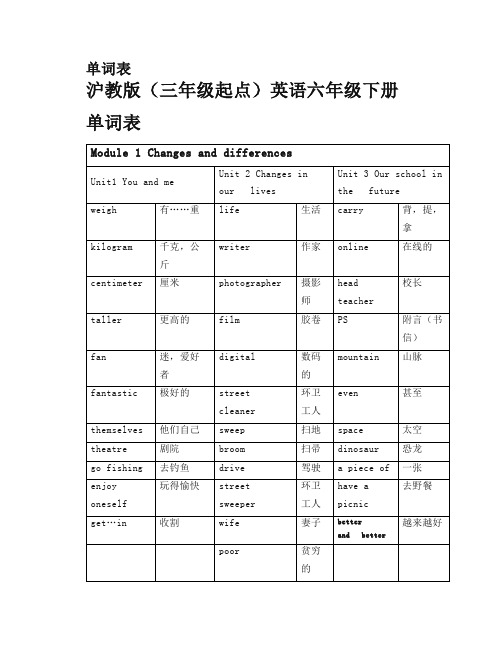
lazy
懒惰的
take off
脱掉
roof
屋顶
yard
院子
hit
碰撞
see the world
见世面
one by one
一个接一个地
look out of
往外看
even
甚至
themselves
他们自己
sweep
扫地
space
太空
theatre
剧院
broom
扫帚
dinosaur
恐龙
go fishing
去钓鱼
drive
驾驶
a piece of
一张
enjoy oneself
玩得愉快
street sweeper
环卫工人
have a picnic
去野餐
get…in
收割
油
craft
手艺,工艺
long race
长跑
oil painting
油画
crown
王冠
short race
短跑
powerful
强有力的
scissors
剪刀
win
获胜
ink
墨水
tape
胶带
long jump
跳远
brush
画笔,刷子
glue
胶水
high jump
跳高
paints
绘画颜料
saw
锯
swimsuit
kilogram
千克,公斤
writer
作家
online
在线的
centimeter
厘米
photographer
上海版牛津英语六年级全重点知识点复习整理[资料]-9页文档资料
![上海版牛津英语六年级全重点知识点复习整理[资料]-9页文档资料](https://img.taocdn.com/s3/m/9e929fbe680203d8ce2f24a9.png)
上海牛津英语六年级上下册全知识点梳理频度副词always/sometimes/usually/never 是频度副词,提问应该要用How often…?在句中的位置是:放在行为动词的前面,放在be动词的后面。
也可以说“行前系后”。
E.g She is always kind.她总是很善良的。
She always helps other people.她总是帮助其他人。
不能出现这样的句子:She is always helps other people.(×)一句话中不能同时出现两个动词。
并且要注意主谓保持一致,尤其注意第三人称单数不可以忽略。
how often 与how many timeshow often 提问“频率次数+时间范围”how many times 提问“频率次数”e.g. —How often do you exercise? —Twice a week.—How many times have you been there? —Twice.副词表示动作特征或性状特征。
一般用来形容或修饰除了名词和代词以外的词,主要修饰形容词、动词、其他副词和句子。
He looks very happy.(修饰形容词)The old lady is walking slowly now.(修饰动词)Luckily, he got the first prize.(修饰句子)形容词后面+ly构成副词:slow—slowly slight—slightly quick—quickly careful—carefully fierce—fiercely immediate—immediately gentle—gently lucky—luckily happy—happily介词What else do you do with your…?你和你的…还干什么?With是个介词,后面接人称代词时,要用宾格的形式。
牛津沪教版英语六年级下基础语法复习
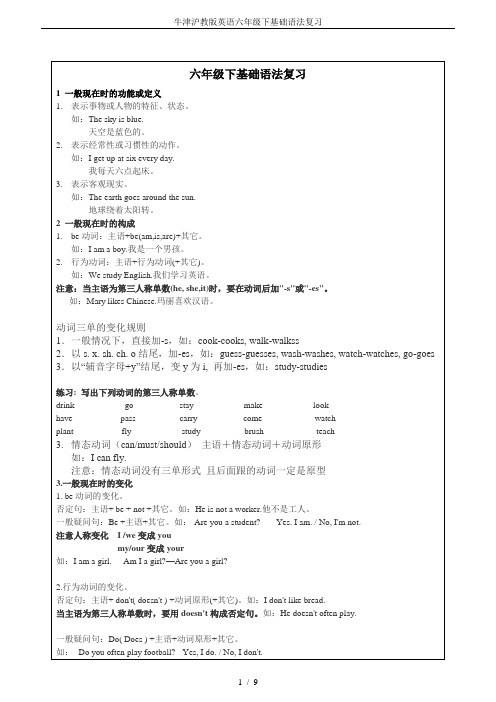
Homework1)课后练习2)复习U1 知识点Ⅰ.Translate the following phrases into English(根据所给的中文,写出相应的词组)1.家谱2.去骑自行车3.去游泳4.玩电脑游戏5.打羽毛球6.去饭店7.去公园8.为他制作一张生日卡9.从她家人得到许多礼物10.和她一起逛街Ⅱ. Complete the sentences with the given words in their proper forms.(根据所给词的适当形式填空).1.What else do you do with _______(she)?2.I am ________(heavy) than you.3.This is ________classmate.(Tom)4.He never goes ______(cycle) with his mother.5.My father usually _______ (play) football with me.6.My classmates like _______(play) basketball.7.I often play with ________(they).8.Tom can work out the problem with ________(he) father.9.Mrs. Smith sometimes _________ (go) to the cinema with her friends.10.Kitty __________(not come) from England.Ⅲ.Look at the pictures and complete the sentences.(看图片填入合适的单词)1.Alice has got a lot of __________from her parents.2.We usually go __________ at weekends.3.My father likes _________ ____________.4.He always _________ _____________.5.They usually go to a _____________ at weekends.IV.Look at James’ family tree and fill in the blanks.(根据家谱,填写下列空格,每空一词)。
小学英语沪教牛津版六年级下册全册知识点整理2

六年级英语下册知识点整理Module Changes and differences【核心词汇】1. 名词kilogram千克;公斤(缩略形式kg) centimetre厘米(缩略形式cm) fan(足球、电影等)迷;爱好者theatre剧院life生活writer作家wish愿望;祝愿mountain山;山脉space太空2. 动词weigh有……重;重drive驾驶carry背;提;拿3. 其他poor贫穷的;差的;次的even甚至4. 短语street cleaner 环卫工人【拓展词汇】1. 名词photographer摄影师film胶卷broom扫帚wife妻子fairy仙子;小精灵PS附言(用于信末) dinosaur恐龙2. 动词sweep扫地3. 形容词fantastic极好的digital数码的4. 副词online在线地;在线的5. 代词themselves他们自己;她们自己;它们自己6. 其他taller更高的7. 短语go fishing去钓鱼enjoy oneself玩得愉快;得到乐趣get … in收割street sweeper 扫地车by hand用手right away立即;马上in a short time很快head teacher 校长 a piece of一张;一片have a picnic去野餐better and better越来越好【核心句型】1. I’m 150 centimetres tall. 我身高150厘米。
解读:这是介绍身高的句型。
“主语 + be动词 + 数字 + 长度单位(+ tall).”可以用来介绍某人的身高。
举一反三: My cousin is 154 centimetres tall. 我的堂弟身高154厘米。
Jim is 149 centimetres tall. 吉姆身高149厘米。
2. There are a lot of tall buildings in the city. 城市里有很多高大的建筑物。
- 1、下载文档前请自行甄别文档内容的完整性,平台不提供额外的编辑、内容补充、找答案等附加服务。
- 2、"仅部分预览"的文档,不可在线预览部分如存在完整性等问题,可反馈申请退款(可完整预览的文档不适用该条件!)。
- 3、如文档侵犯您的权益,请联系客服反馈,我们会尽快为您处理(人工客服工作时间:9:00-18:30)。
Module Changesanddifferences一、核心词汇1.名词kilogram千克;公斤(缩略形式kg)centimetre厘米(缩略形式cm)fan(足球、电影等)迷;爱好者theatre剧院life生活writer作家wish愿望;祝愿mountain山;山脉space太空2.动词weigh有……重;重drive驾驶carry背;提;拿3.其他poor贫穷的;差的;次的even甚至4.短语streetcleaner环卫工人二、拓展词汇1.名词photographer摄影师film胶卷broom扫帚wife妻子fairy仙子;小精灵PS附言(用于信末)dinosaur恐龙2.动词sweep扫地3.形容词fantastic极好的digital数码的4.副词online在线地;在线的5.代词themselves他们自己;她们自己;它们自己6.其他taller更高的7.短语gofishing去钓鱼enjoyoneself玩得愉快;得到乐趣get…in收割streetsweeper扫地车byhand用手rightaway立即;马上inashorttime很快headteacher校长apieceof一张;一片haveapicnic去野餐betterandbetter越来越好三、核心句型1.I’m150centimetrestall.我身高150厘米。
解读:这是介绍身高的句型。
“主语+be动词+数字+长度单位(+tall).”可以用来介绍某人的身高。
举一反三:Mycousinis154centimetrestall.我的堂弟身高154厘米。
Jimis149centimetrestall.吉姆身高149厘米。
2.Therearealotoftallbuildingsinthecity.城市里有很多高大的建筑物。
解读:Therebe句型中的be动词的变化遵循就近原则,be动词用is还是用are 是由be动词后面最近的名词来决定。
Therebe句型的一般疑问句把系动词be提前,肯定回答用“Yes,there+be动词.”否定回答用“No,there+be动词+not.”。
举一反三:Thereisatreenearmyhouse.我家的房子旁边有一棵树。
Therearesomebooksandapenonthedesk.桌子上有一些书和一支钢笔。
—Isthereabusstopnearhere?这附近有一个汽车站吗?—Yes,thereis.是的,有。
/No,thereisn’t.不,没有。
Thereisn’tacomputerinmyroom.我的房间里没有电脑。
3.Iusuallyplayfootballafterschool.我通常放学后踢足球。
解读:play与球类名词相连,之间不加冠词;play与乐器名词相连,之间加定冠词the。
举一反三:Ilikeplayingvolleyball.我喜欢打排球。
Mysistercanplaytheguitar.我的妹妹会弹吉他。
4.Inthepast,sheusedapenandpapertowriteherbooks.Nowsheusesacomputer.过去,她使用钢笔和纸来写书。
现在她使用电脑(写书)。
解读:inthepast为一般过去时态的标志;now为现在时态的标志。
举一反三:Inthepast,wedidn’thaveanycomputers.Nowwehavemanycomputers.过去我们没有电脑。
现在我们有许多电脑。
5.“Fred,I’dliketogiveyouthreewishes,”saidthefairy.“弗雷德,我愿意满足你三个愿望。
”仙女说道。
解读:wouldliketodosth意为“愿意/想要做某事”。
举一反三:Wouldyouliketogowithme?你愿意和我一起去吗?Hewouldliketobuyabikeforhisson.他想要给他儿子买一辆自行车。
6.Wehopeourschoolwillgetbetterandbetter.我们希望我们的学校将会变得越来越好。
解读:hope意为“希望”,后可接宾语从句,用一般将来时态。
四、了解句型1.—Howmuchdoyouweigh,George?乔治,你多重呢?—Iweigh40kilograms.我体重40千克。
解读:Howmuch意为“多少”,可以提问某人的重量,也可以提问价格,或者对不可数名词进行提问。
2.Howexciting!多么令人兴奋啊!解读:“How+形容词/副词!”为感叹句的省略形式,其完整形式为“How+形容词/副词+主语+谓语!”3.Iwishyouahappylife.我祝你们生活幸福。
解读:wish后可接双宾语,也可用wishsbtodosth的结构。
4.Robotswillhelpusfindbooksinthelibrary.在图书馆里,机器人将会帮助我们找寻书。
解读:helpsb(to)dosth意为“帮助某人做某事”。
Module Workandplay一、核心词汇1.名词oil油brush画笔;刷子;刷paints绘画颜料artist艺术家;(尤指)画家scissors剪刀tape胶带glue胶水tool工具2.形容词unhappy不高兴的3.副词carefully仔细地easily容易地still仍然4.动词win获胜;赢5.短语longrace长跑shortrace短跑longjump跳远highjump跳高二、拓展词汇1.名词ink墨水;墨汁craft手艺;工艺crown王冠;皇冠saw锯craftsman工匠;手艺人(复数craftsmen)swimsuit(尤指女式的)游泳衣2.形容词powerful强有力的;力量大的fit健壮的3.代词himself他自己4.其他oilpainting油画Chineseinkpainting中国水墨画ontheleft在左边ontheright在右边allthetime一直;始终modelhouse房子模型alongtimeago很久以前atwork忙着(做事情)saytooneself自言自语swimmingcap游泳帽swimmingpool 游泳池warm-up准备活动;热身练习swimminggoggles游泳镜三、核心句型1.Thestudentsaregoingtoanartmuseumtomorrow.学生们明天将去一家艺术博物馆。
解读:这是一般将来时的句型,介绍某人将要做什么。
举一反三:HeisgoingtoswimnextSunday.他下周日将去游泳。
TheyaregoingtoShanghaitomorrow.他们明天将去上海。
2.Lookatthetwopicturesontheblackboard.看黑板上的两幅画。
解读:这是祈使句。
祈使句一般表示命令、劝告、请求、禁止等。
举一反三:Closethedoor.关门。
Washyourclothesbyyourself.你自己洗衣服。
3.Whichonedoyoulike?你们喜欢哪幅?解读:这是询问喜欢哪一个的句型。
回答的时候选择其中的一个进行回答。
举一反三:—Whichonedoyoulike,theredoneorthegreenone?你喜欢哪一个,红色的还是绿色的?—Theredone.红色的。
4.Whydowedraweggsallthetime?为什么我们一直要画鸡蛋呢?解读:这是询问做某事的原因。
回答常用“Because…”。
举一反三:—Whydoyoumissthetrain?你为什么错过了火车?—BecauseIgetuplate.因为我起晚了。
5.—Whatareyoumaking?你正在制作什么?—I’mmakingatoyplaneformybrother.我正在给我弟弟制作一个玩具飞机。
解读:这是询问某人正在做什么及回答的句型。
举一反三:—Whatareyoudoing?你正在做什么?—I’mlisteningtotheradio.我正在听收音机。
6.Iwanttomakeacrown.我想要制作一顶王冠。
解读:这是描述某人想要做某事的句型。
举一反三:Shewantstoplayping-pong.她想打乒乓球。
7.—Whoisitfor?它是给谁的?—It’sformylittlecousin.是给我小堂妹的。
解读:这是给谁及回答的句型。
举一反三:—Whoisitfor?它是给谁的?—It’sformyfather.是给我爸爸的。
8.Alongtimeago,therewasacraftsman.很久以前,有一位工匠。
解读:这是描述过去发生的事情的句型,句子常用过去时态。
举一反三:Alongtimeago,therewasaking.很久以前,有一位国王。
9.WehavetwoPElessonsatschooleveryweek.我们每周在学校上两节体育课。
解读:这是用一般现在时谈论日常活动的句型。
举一反三:Sheoftenwalkstoschool.她经常步行去上学。
10.Jillisgoodatthehighjump.吉尔擅长跳高。
解读:这是谈论某人擅长做某事的句型。
举一反三:Mymotherisgoodatcooking.我妈妈擅长做饭。
11.MyfriendandIlikeplayingsport.我和我的朋友们喜欢运动。
解读:这是表达某人喜欢做某事的句型。
举一反三:Mygrandfatherlikesplantingflowers.我爷爷喜欢种花。
四、了解句型1.Thestudentsaregoingtoanartmuseumtomorrow.学生们明天要去一家艺术博物馆。
解读:“begoingto+动词原形”为一般将来时态的结构。
2.LittleLeotookdrawinglessons.小里奥上绘画课。
解读:“take+动词-ing+lessons”意为“上某种课程”。
3.That’seasy!那很容易!解读:用来评价某事的句型。
4.That’sgood.那很好。
解读:用来评价某事的句型。
5.WehavetwoPElessonsatschooleveryweek.我们每周在学校上两节体育课。
解读:时间状语为everyweek,该句用一般现在时态。
6.Sometimesweplayballgames.有时我们做球类运动。
解读:时间状语为sometimes,用一般现在时态。
Module Thingswedo一、核心词汇1.名词bell铃铛neck脖子gatekeeper门卫sign标识middle中间;中部;中心path小路;小径can金属罐rubber橡皮vase花瓶penholder笔筒envelope信封rubbishbin垃圾桶truck卡车piece碎片;碎块cloth布;布料2.动词praise赞扬;称赞worry担心follow跟随;跟着reuse重新利用3.形容词special特别的lost迷路的;迷失的plastic塑料制的;塑料的4.副词ago以前5.情态动词may可能;可以6.短语praise…for…因……而表扬……inthemiddle在中间lookout小心;当心nosmoking禁止吸烟noswimming禁止游泳getlost迷路sometime一段时间ontheway在路上throwaway扔掉二、拓展词汇must必须should应该seat座位三、核心句型1.Wecanhelpyou.我们能帮助你。
